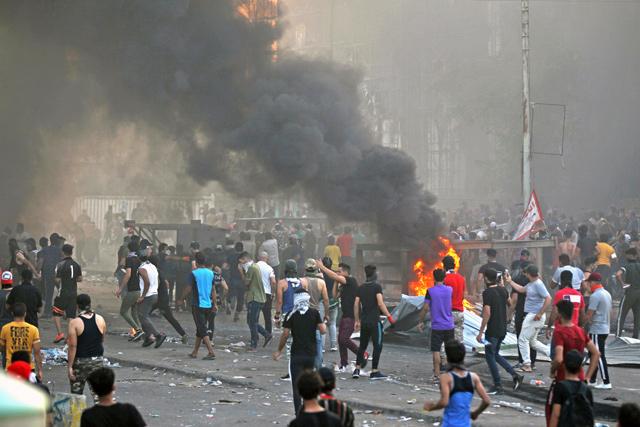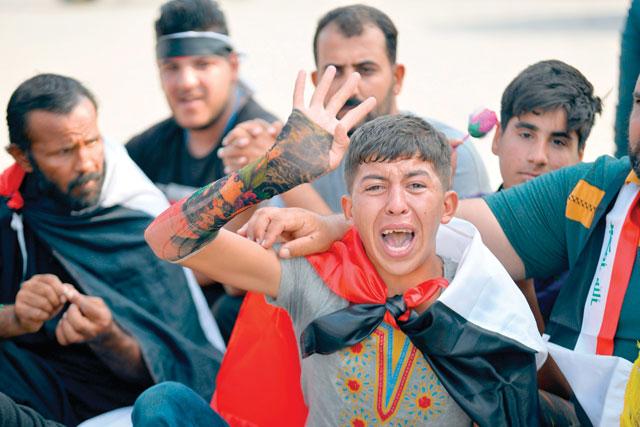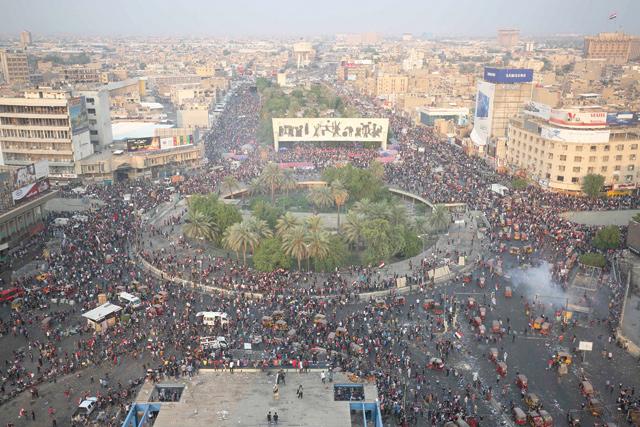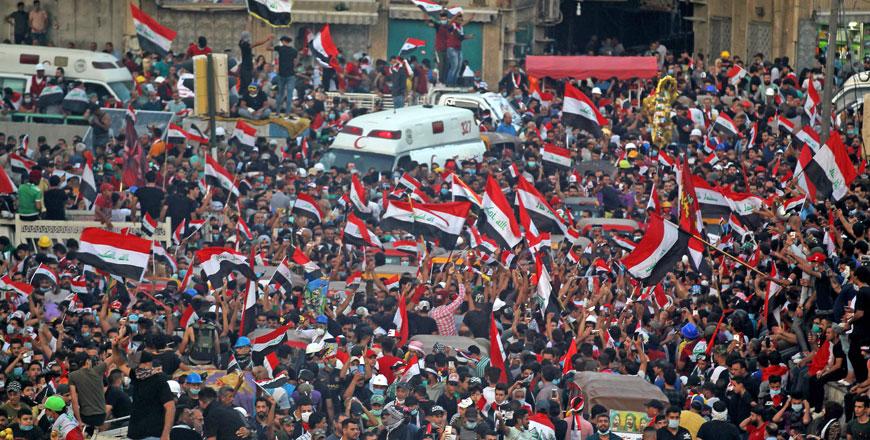You are here
Thousands in bloody protests across Iraq, 28 dead
By AFP - Oct 04,2019 - Last updated at Oct 04,2019

Iraqi protesters demonstrate against state corruption, failing public services, and unemployment in the Iraqi capital Baghdad's central Tayeran Square on Thursday (AFP photo)
BAGHDAD — Thousands of protesters clashed with riot police in Iraq's capital and across the south on Thursday, the third day of mass rallies that have left 28 dead.
Defying curfews, tear gas and live rounds, they gathered by truckfuls to vent their anger against corruption, unemployment and poor services in the biggest challenge yet to Prime Minister Adel Abdel Mahdi.
As dusk fell in Baghdad, crowds swelled around the capital's oil and industry ministry, pledging to march to the capital's emblematic Tahrir (Liberation) Square.
"We'll keep going until the government falls", pledged 22-year-old Ali, an unemployed university graduate.
"I've got nothing but 250 lira [20 US cents] in my pocket while government officials have millions," he told AFP.
Most demonstrators carried the Iraqi tricolour while others brandished flags bearing the name of Hussein, the Prophet Mohammed's grandson and a revered figure in Shiite Islam.
Riot police and army troops fired at the ground from automatic weapons mounted on military vehicles, the bullets ricocheting into the crowd.
Wounded protesters piled into small tuk-tuks to reach hospitals.
"Why do the police shoot at Iraqis like them? They suffer like us — they should help and protect us," said protester Abu Jaafar.
The three days of demonstrations have left 28 people dead, including two police officers, and over 1,000 people have been wounded.
More than half of those killed in the last three days have been in the southern city of Nasiriyah, where six protesters were shot dead and dozens wounded on Thursday alone.
Nearby Amarah has also seen significant bloodshed, with medics and security sources reporting four protesters shot dead on Thursday.
Later in the day, two protestors and a police officer were killed in Diwaniyah, 150 kilometres south of Baghdad, and a curfew was subsequently imposed.
Anger boils over
Rallies began on Tuesday in Baghdad but have since spread across the mainly Shiite south, including the provinces of Dhi Qar, Missan, Najaf, Basra, Wasit and Babylon.
Several cities have imposed curfews, but protesters flooded the streets regardless.
The Kurdish northern regions and Sunni western provinces, meanwhile, have remained relatively calm.
The grievances echo those of mass demonstrations in Iraq’s south a little over a year ago which were prompted by a severe water shortage that caused a widespread health crisis.
Since then, southern provinces have accused the central government of failing to address profound infrastructural gaps, chief among them youth unemployment.
Tensions have been exacerbated by the closure of government offices in Baghdad and calls by firebrand cleric Moqtada Al Sadr for “a general strike”.
Sadr was behind the last round of major protests in Baghdad in 2016, when his supporters stormed the Green Zone, home to some ministries and embassies.
His involvement appears much more limited this time, but if his followers join the protests en masse, the rallies will likely balloon even further.
‘Draconian measures’
With internet access virtually shut off, demonstrators on Thursday struggled to communicate with each other or post footage of the latest clashes.
Approximately 75 per cent of Iraq is “offline” after major network operators “intentionally restricted” access, according to cybersecurity monitor NetBlocks.
The United Nations, European Union and United Kingdom have all appealed for calm, while rights group Amnesty International slammed the response to protests.
“It is outrageous that Iraqi security forces time and again deal with protesters with such brutality using lethal and unnecessary force,” said Amnesty’s Lynn Maalouf.
She said the internet blackout was a “draconian measure... to silence protests away from cameras and the world’s eyes”.
The protests appear to be largely spontaneous and de-centralised, with virtually no party insignia or slogans spotted.
Instead, demonstrators brandished Iraqi flags, posters demanding a “real country” and even pictures of an Iraqi general who was recently decommissioned after reported pressure by pro-Iran factions.
Their rage has not been quelled by the government’s relatively modest reactions.
Several Iraqis said they received on Thursday text messages from Abdel Mahdi’s office giving a number for a hotline that protesters could call to air their grievances.
The premier, who has not addressed the demonstrators directly, has also infuriated many of his compatriots by blaming the violence on “aggressors who... deliberately created casualties”.
Abdel Mahdi came to power in October 2018 as a consensus candidate, after last year’s popular demonstrations effectively ended his predecessor Haider Al Abadi’s chances at a second term.
He pledged to reform inefficient institutions, eradicate corruption and fight unemployment — unfulfilled promises that appear to have pushed protesters over the edge this week.
In particular, anger has boiled over at the staggering level of youth unemployment, which stands at around 25 per cent or double the overall rate, according to the World Bank.
Related Articles
BAGHDAD — Iraqi students joined anti-government protests in Baghdad on Sunday, ramping up the street pressure on Prime Minister Adel Abdel M
BAGHDAD — The Iraqi army on Monday announced it would impose an overnight curfew in the capital as students and schoolchildren joined spread
BAGHDAD — Iraqi President Barham Saleh vowed Thursday to hold early parliamentary elections once a new law is passed and said the country's














